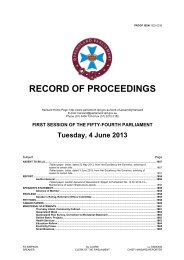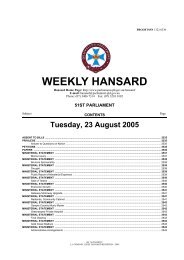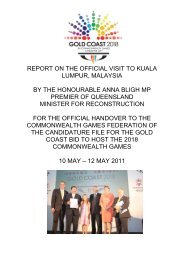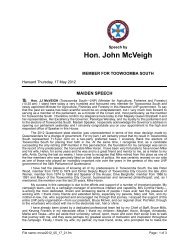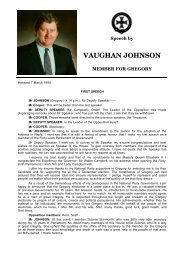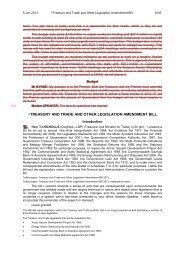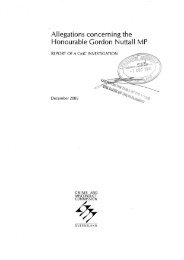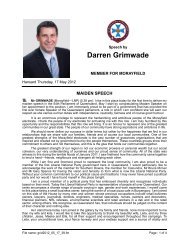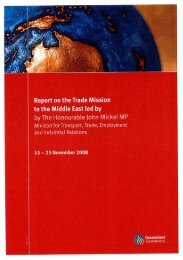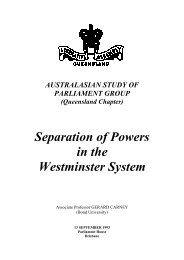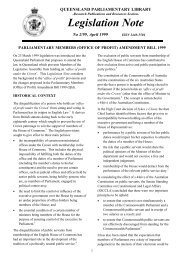Full transcript - Final - Queensland Parliament - Queensland ...
Full transcript - Final - Queensland Parliament - Queensland ...
Full transcript - Final - Queensland Parliament - Queensland ...
You also want an ePaper? Increase the reach of your titles
YUMPU automatically turns print PDFs into web optimized ePapers that Google loves.
9 Mar 1999 Trans-Tasman Mutual Recognition (<strong>Queensland</strong>) Bill 339<br />
regular stakeholder meetings—to name just a<br />
few. The proposed Bill will further enhance<br />
these remaining avenues of community input<br />
through the establishment of a ministerial<br />
advisory council, which will be broadly<br />
representative of stakeholders. From a political<br />
perspective, this structural amendment<br />
reinstates clear lines of accountability between<br />
the prison system and the Minister responsible<br />
for that system.<br />
At the end of the day as Minister, the<br />
people of <strong>Queensland</strong> hold me responsible.<br />
As it stands, if there is an escape or a death in<br />
custody, it is not the board—the policy<br />
makers—who are responsible; it is me in my<br />
role as Minister. Indeed, the Leader of the<br />
Opposition appears to agree. In the Courier-<br />
Mail on 24 October 1998, Mr Borbidge was<br />
reported to have said—<br />
"There has been a tendency in<br />
recent years for Governments to hand<br />
control of the public administration of<br />
certain policies to unelected commissions<br />
or councils."<br />
He continued—<br />
"They are not interested if the<br />
Government of the day has delegated<br />
responsibility to someone else because,<br />
at the ballot box, the someone else is not<br />
accountable."<br />
He further said—<br />
"Governments have not had their<br />
hands on the levers and have paid the<br />
ultimate political price."<br />
We are now regaining hold of the levers and<br />
restoring the direct lines of accountability to the<br />
Minister.<br />
I would now like to turn to the<br />
amendments to the Corrective Services Act<br />
1988 that provide a head of power for the<br />
management of maximum security prisoners.<br />
The Bill outlines conditions necessary for a<br />
prisoner to be placed on a maximum security<br />
order and then accommodated within a<br />
maximum security facility. The purpose of<br />
these facilities is to provide intensive<br />
supervision and management of prisoners who<br />
have been assessed as highly disruptive within<br />
the correctional system.<br />
Of the group presently accommodated<br />
within the maximum security unit at Woodford,<br />
55% have committed murder. Of those, 15%<br />
are multiple murderers and 45% have been<br />
convicted of, or are under investigation for,<br />
murders within a prison. This "hard core" group<br />
of prisoners have a propensity for violence and<br />
must be managed accordingly. And 75% of<br />
prisoners in the maximum security unit have<br />
either tried to escape and succeeded—many<br />
on more than one occasion—or have put staff<br />
in danger through their involvement in<br />
attempts to escape. The proposed<br />
amendments also set out the basis for a<br />
maximum security order to be authorised.<br />
These orders will be limited to six months'<br />
duration. However, consecutive orders can be<br />
made.<br />
These provisions are required urgently, as<br />
are all of the above amendments. We need a<br />
system that keeps pace with the demands<br />
confronting it, a system that cannot afford to<br />
relax in the eyes of the community, yet a<br />
system that has a responsibility to rehabilitate<br />
and integrate offenders as best it can to<br />
ensure the community's safety. <strong>Queensland</strong><br />
needs a system that improves on the<br />
successes of the past, a system which<br />
provides the security in our prisons which the<br />
public demands and is entitled to expect.<br />
I commend the Bill to the House.<br />
Debate, on motion of Mr Horan,<br />
adjourned.<br />
TRANS-TASMAN MUTUAL RECOGNITION<br />
(QUEENSLAND) BILL<br />
Second Reading<br />
Resumed from 6 August 1998 (see<br />
p. 1724).<br />
Hon. R. E. BORBIDGE (Surfers<br />
Paradise—NPA) (Leader of the Opposition)<br />
(12.45 p.m.): I am in the somewhat unusual<br />
position of speaking or responding to a Bill that<br />
I had the privilege of introducing into this<br />
place. Needless to say, I find this splendid<br />
piece of legislation somewhat difficult to<br />
criticise. However, I would like to make certain<br />
comments and certain remarks, because this<br />
is an important piece of legislation that has<br />
taken some time to be debated in this place.<br />
There is broad bipartisan support for the<br />
principles embodied in the closer economic<br />
relations arrangements which bring Australia<br />
and New Zealand together in what is still the<br />
world's best and most effective example of a<br />
common market. In an uncertain world<br />
economic climate, <strong>Queensland</strong> can only<br />
benefit from its entrenched place within the<br />
Australasian market created by CER. Our<br />
interests are directly served by strengthening<br />
the community of interest between Australia<br />
and New Zealand.<br />
Recent events have produced an impetus<br />
to look beyond the former almost exclusive<br />
focus on East Asia. Japan remains deeply<br />
mired in an economic morass from which it will<br />
extricate itself only by the application of



